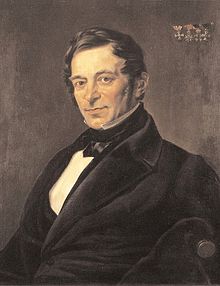Leopold Schoeller
Heinrich Leopold Schoeller (born June 10, 1792 Schleiden Castle ; † December 18, 1884 in Düren ) was a German entrepreneur and founder of the Düren carpet office , which later became the anchor carpet factory .
life and work
The son of the cloth manufacturer and co-founder of the Schoeller fine cloth factory, Johann Arnold Schoeller (1747–1831) and Lucia Katharina Peuchen (1752–1832), moved to Düren with his parents in 1800. After completing his school education, he joined his parents' company as an apprentice in 1807. When the continental barrier was lifted, he set up shop in Amsterdam in 1813 as a wholesaler for English cloths and manufactured goods. In 1815 Leopold Schoeller returned to Düren and founded a cloth factory here with his brother Carl Friedrich Schoeller (1784–1860). On March 19, 1819, he and one other brother, Johann Peter Schoeller (1778–1838) had one imperial concession for the construction of such a plant in Brno . The management of this Gebr. Schoeller kk Feintuch- und Wollwarenfabrik Brünn was transferred to their common nephew Philipp Wilhelm von Schoeller (1797–1877), who later inherited the company.
In 1842 Leopold separated from his brother Friedrich and founded the cloth factory Leopold Schoeller & Sons with his sons in Düren , whose products were characterized by the highest quality. Twelve years later, this company became the carpet office. Leopold Schoeller, however, thought on a larger scale. In 1843 he bought the worsted yarn spinning mill in Breslau and in 1851 he took a share in the Düren flax yarn spinning mill Schoeller, Mevissen & Bücklers . With his urge to expand, Schoeller did not limit himself to the textile industry. In 1848 he secured, together with the miner Eduard Honigmann and the Aachen justice of the peace Friedrich Ernst Bölling, the concession for the 1.75 million square meter field " Maria " in Alsdorf near Aachen to operate a mine, which in 1890 was transferred to the association for coal mining in the worm area was convicted. Several goods and sugar factories were bought in Silesia. In 1869 Schoeller took a share in the newly founded sugar factory Schoeller, Peill & Brockhoff , the first sugar factory on the left bank of the Rhine.
Schoeller has been on the board of directors of the Rheinische Eisenbahngesellschaft since it was founded. It is attributed to his use that Düren was connected to the Cologne-Aachen railway line. Schoeller also had considerable political influence: for 30 years he was a member of the Düren city council , for many years he was a member of the district assembly and in 1847 also a member of the Prussian state parliament .
As a typical representative of the progressive industrial bourgeoisie, Schoeller was also committed to the church and society: He campaigned for the Evangelical Reformed community in Düren and founded the boys' family school in 1828 . In 1832 he donated the site for his own building. This middle school later became the Düren secondary school, today the grammar school at Wirteltor . In addition to a health insurance scheme, Schoeller also set up a foundation for invalids and women who have recently given birth for his workers . In 1856 he was appointed the Prussian Privy Councilor of Commerce . Leopold Schoeller died on December 18, 1884 in Düren at the old age of 92. He found his final resting place in the Evangelical Cemetery in Düren .
family
The Schoeller family is one of the Düren entrepreneurial families who are internationally renowned. Its origins can be traced back to 1382. All Schoellers living in Düren today are descended from Joeris Schoeller, who ran an ironworks in Gemünd from 1550.
In 1820 Leopold Schoeller married Emilie Schöller (1800–1854), the daughter of Düsseldorf's Mayor Philipp Schöller from the former Jülich line of the Schoeller family. From this marriage there were six sons and one daughter.
Of his sons, his eldest son Caesar Schoeller (1822–1887) ran an import trade in New York City, among other things . The second son, Rudolf Wilhelm Schoeller (1827–1902), took over the worsted spinning mill in Breslau , merged it with the worsted spinning mill and weaving mill Eitorf AG and relocated these companies to Bregenz and Zurich . (Philipp Eberhard) Leopold Schoeller (1830–1896), the third son, took over and expanded his father's Silesian sugar factories, while the fourth son, the secret commercial councilor Philipp Nikolaus Ludwig (1833–1904), succeeded him in the management of the Düren carpet office started. Alexander Paul Schoeller (1837-1892), the fifth son, took care of his father's local sugar factories, founded his own factories for this purpose and brought them together in the Jülich sugar factory , where his son, later the ethnologist Max Schoeller , became a member of the board.
Web links
- FM Feldhaus: Memories of a great Dürener in: Dürener Zeitung from January 11, 1950
- The Schoeller family and the Düren textile industry - 150 years of Anker-Carpeting , Gebr. Schoeller GmbH + Co. KG (ed.), Düren, short biography p. 9ff
Individual evidence
- ^ Hugo Schoeller, August Victor Schoeller: History of the Schoeller Family , 2 volumes. R. Eisenschmid, Berlin 1894. New edition by Stedman and Wallmoden 1994, ISBN 3-9803288-2-1
| personal data | |
|---|---|
| SURNAME | Schoeller, Leopold |
| ALTERNATIVE NAMES | Schoeller, Heinrich Leopold (full name) |
| BRIEF DESCRIPTION | German entrepreneur and founder of the Anker carpet factory |
| DATE OF BIRTH | June 10, 1792 |
| PLACE OF BIRTH | Schleiden |
| DATE OF DEATH | December 18, 1884 |
| Place of death | Düren |

